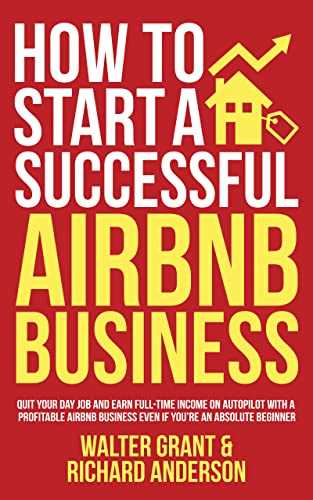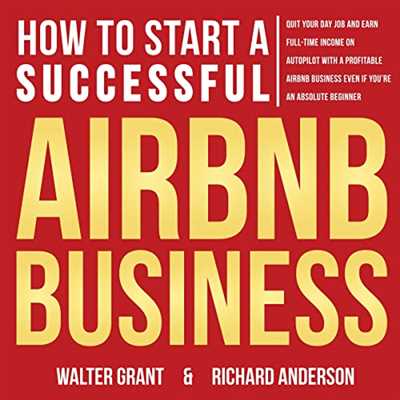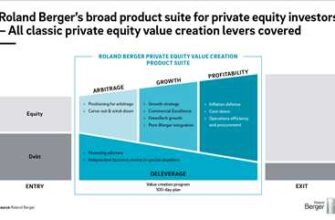
If you have a property that you’re not using, why not consider renting it out on Airbnb? With over a million listings on the platform, many hosts have found great success in turning their properties into profitable Airbnb businesses. But how do they do it? In this guide, we will walk you through the basics of starting your own Airbnb business, from setting up an account to researching your area and everything in between.
First and foremost, you’ll need to create an Airbnb account. Setting up an account is easy and only takes a few minutes. Once you have an account, you can start listing your property on the platform. Before you do, though, it’s important to familiarize yourself with the regulations and laws regarding short-term rentals in your area. Make sure that renting out your property on Airbnb is allowed and that you comply with any necessary regulations.
Next, you’ll want to do some research on the market in your area. Look at other listings on Airbnb to get an idea of pricing and what amenities other hosts are offering. Additionally, consider the expenses you’ll incur while running your Airbnb business, such as cleaning fees and maintenance costs. Having a solid plan in place before you get started will help you focus and set realistic goals.
Once you’ve done your research and have a plan in place, it’s time to start hosting guests! Before guests arrive, make sure your property is clean, well-maintained, and stocked with essentials like fresh linens and toiletries. Communication with your guests is key, so be sure to respond promptly to any inquiries and provide clear instructions for check-in and check-out.
As you become more experienced with hosting on Airbnb, you may want to consider expanding your business. This could involve re-renting multiple properties or even becoming a property manager for other hosts. The possibilities are endless, and with the right strategies and dedication, you can create a thriving Airbnb business.
In conclusion, starting an Airbnb business can be a lucrative venture if you take the time to plan and prepare. Don’t be discouraged by the competition – instead, use it as motivation to provide a unique and valuable experience for your guests. With the right mindset and a focus on providing exceptional service, your Airbnb business can be the start of something truly amazing.
- How to start an Airbnb business – the basics
- What do I need to consider before setting up an Airbnb business
- Consider Airbnb Rental Arbitrage Route
- Setting up your Airbnb hosting account
- How to start an Airbnb business
- Research the Airbnb regulations in your area
- Have a business plan
- How to set your pricing
- Plan out the processes
- Focus on the basics
- Video:
- How To Make Money On Airbnb WITHOUT Renting or Owning in 2023!
How to start an Airbnb business – the basics
If you are considering starting an Airbnb business, there are several key steps you need to follow in order to ensure success. In this guide, we will give you an overview of the basics that every aspiring Airbnb host should consider before diving into this lucrative venture.
First and foremost, you need to research the rules and regulations in your area regarding short-term rentals. Each city or region may have specific laws and requirements that you need to adhere to when renting out your property on platforms like Airbnb. Make sure to check what permits or licenses you may need and familiarize yourself with any restrictions on renting out your home.
Next, you will need to set up an Airbnb account. This process is fairly easy and straightforward. Simply go to the Airbnb website and sign up as a host. You will need to provide some basic information about yourself and your property, including its location, size, and amenities. Make sure to include high-quality photos that showcase your property in the best light.
Once you have set up your account, you can start listing your properties on Airbnb. You can add as many properties as you want, but it’s important to focus on quality over quantity. Make sure your listings are accurate and informative, highlighting the unique features of each property. Consider pricing your rentals competitively to attract more guests.
Communication with your guests is key to being a successful Airbnb host. Make sure to respond promptly to inquiries and provide clear and concise information about your property. Setting expectations and being transparent about your house rules, check-in/out procedures, and any additional fees or charges will help ensure a smooth and positive experience for both you and your guests.
Before your first guests arrive, you should have a plan in place for cleaning and maintenance. You may choose to handle these tasks yourself or hire a cleaning service to do it for you. Either way, make sure your property is clean, well-maintained, and properly equipped with essentials such as towels, linens, and toiletries.
As your Airbnb business grows, you may want to consider expanding into other platforms or markets. Sites like Vrbo, Booking.com, and HomeAway can provide additional exposure and potential bookings for your properties. Do your research and determine which platforms align with your goals and target audience.
Running an Airbnb business is not just about renting out your properties and making money. It also involves being a responsible host and taking into account all expenses and potential risks. Things like insurance, taxes, and legal liabilities should be taken into consideration. Keep track of your income and expenses to ensure you are running a profitable and sustainable business.
In conclusion, starting an Airbnb business can be a great way to earn extra income and make the most out of your properties. However, it requires careful planning, research, and a focus on providing exceptional guest experiences. By following these basics steps and guidelines, you will be well on your way to becoming a successful Airbnb host.
What do I need to consider before setting up an Airbnb business
Setting up an Airbnb business can be a lucrative endeavor, but it’s important to carefully consider a few key factors before diving in.
Research the regulations: Before getting started, it’s crucial to research the regulations in your area regarding short-term rentals. Some cities have strict rules and limitations on hosting Airbnb properties, so make sure you’re in compliance with them.
Check your expenses: It’s essential to carefully calculate the expenses you’ll have to bear when running an Airbnb business. These expenses can include property maintenance, cleaning services, utility bills, insurance, and more. Having a clear understanding of the financial aspect will help you plan your pricing and ensure that you’re making a profit.
Focus on communication: Communication is key when hosting guests in your Airbnb. It’s important to have efficient and reliable communication processes in place, so guests can easily reach out to you with any questions or concerns. Providing prompt and helpful responses will enhance the guest experience and boost your reputation as a host.
Consider the basics: There are several basics you need to have in place before listing your property on Airbnb. These basics include having a clean and well-maintained home, providing essential amenities, setting up reliable internet access, and ensuring a smooth check-in and check-out process for guests.
Research the market: Before deciding to rent out your property on Airbnb, it’s worth doing thorough research on the market in your area. Look at the demand for short-term rentals, the average pricing, and the competition. This information will give you a clearer picture of the potential income you can generate and help you make an informed decision.
Consider the legal route: Some property owners choose to go down the route of arbitrage, which involves renting properties specifically for Airbnb purposes. However, it’s important to consider the legal implications of this practice. In some cases, re-renting a property without permission may not be allowed, so consult with local laws and regulations before taking this step.
Host in a desirable location: Location plays a crucial role in the success of your Airbnb business. If your property is in a popular area, there will be greater demand and higher pricing opportunities. Consider the proximity to attractions, public transportation, restaurants, and other amenities when choosing a property to host on Airbnb.
Be prepared for the management: Hosting an Airbnb property involves more than just providing a place to stay. You’ll need to be prepared for the management aspects, including handling bookings, coordinating with cleaning services, handling guest inquiries, and ensuring a smooth experience for all parties involved.
Additional considerations: Additionally, you should also consider factors such as local taxes that may apply to your Airbnb business, the potential impact on your homeowner’s insurance, any necessary permits or licenses, and the level of competition in the area. It’s important to have a well-thought-out plan and be prepared for the challenges that may arise.
By taking these considerations into account, you can set up a successful Airbnb business and make the most out of this popular platform.
Consider Airbnb Rental Arbitrage Route
If you are interested in starting an Airbnb business, there is a route that you should consider called rental arbitrage. This route can give you the basics of running a rental and allow you to rent out properties on Airbnb without actually owning them.
The first step in rental arbitrage is to find a property that you can re-rent on Airbnb. This could be a property where the owner is open to hosting guests, or it could be a property that is already listed on Airbnb but is not being used to its full potential.
Before jumping into rental arbitrage, it is important to check the regulations in your area regarding hosting on platforms like Airbnb. Make sure you understand what is allowed and what is not before getting started.
When considering renting out properties on Airbnb, pricing will be an important factor. Do your research to see what other hosts are charging in your area and consider the expenses you will have to cover, such as cleaning and maintenance.
Additionally, hosts should have good communication skills and be easy to work with. Having an Airbnb account and a plan in place for handling any issues that may arise is essential.
When renting out properties on Airbnb, hosts should also consider the value they can add to the guest experience. Think about what amenities or unique features you can offer that will make your listing stand out.
Another important aspect of rental arbitrage is managing multiple properties. As your business grows, you may want to consider using property management services to help with the day-to-day processes.
In summary, if you are looking to start an Airbnb business and don’t have the funds to purchase your own properties, rental arbitrage can be a lucrative route to consider. However, it is important to do your research, understand the regulations in your area, and have a plan in place for managing and maintaining the properties you rent out.
Setting up your Airbnb hosting account
When it comes to starting your own Airbnb business, setting up your hosting account is the crucial first step. By creating an account on the Airbnb platform, you will gain access to a vast network of potential guests and be able to market your property to reach a wider audience.
To get started, you will need to do some research and familiarize yourself with the basics of hosting on Airbnb. Understanding the processes and regulations in your area is essential to ensure you are compliant with local laws and regulations. Additionally, it is worth considering the expenses and maintenance involved in running an Airbnb, as well as the pricing strategy you will adopt to maximize your revenue.
Here are some steps to guide you through the process of setting up your Airbnb hosting account:
- Begin by signing up on the Airbnb platform and creating your host account.
- Provide detailed information about your property, including its location, size, amenities, and any unique selling points that will attract guests.
- Upload high-quality photos of your property that showcase its best features and create an appealing listing.
- Set your rental rates based on factors such as location, seasonality, and market demand. Consider researching similar properties in your area to get an idea of the pricing range.
- Create a house manual that outlines the rules, expectations, and guidelines for guests to follow during their stay.
- Decide on the booking settings and availability of your property. Determine the minimum and maximum number of nights guests can stay, and whether you prefer short-term or long-term rentals.
- Establish clear communication channels with your guests. Airbnb provides messaging features that allow you to communicate directly with them regarding their reservation, check-in process, and any other details they may need.
- Additionally, check if your local regulations require you to obtain any permits or licenses before renting out your property. Some areas have restrictions or may require you to meet specific criteria.
- Before listing your property, take the time to thoroughly clean, organize, and stage it to make it more appealing to potential guests.
- Once you have everything set up, publish your listing on Airbnb and make it visible to potential guests. Make sure to regularly update your calendar and availability to stay on top of bookings.
By following these steps and having a well-thought-out plan, you will be well on your way to becoming a successful Airbnb host. Remember to focus on providing a positive guest experience, as word-of-mouth recommendations can greatly contribute to the success of your business.
How to start an Airbnb business
Starting an Airbnb business can be an exciting and profitable endeavor. If you’re considering renting out properties on Airbnb, there are several important steps to follow to ensure a successful venture.
1. Do your research: Before diving into the world of Airbnb hosting, it’s important to thoroughly research the platform and understand how it works. Familiarize yourself with the basics of the rental process, host responsibilities, and regulations in your area.
2. Set up an Airbnb account: To start renting out properties on Airbnb, you’ll need to create an account on the platform. This will allow you to list your properties, manage bookings, communicate with guests, and receive payments.
3. Consider your properties: When considering which properties to rent out on Airbnb, think about their location, amenities, and potential demand. Take into account factors such as proximity to tourist attractions, the condition of the property, and the amount of maintenance required.
4. Determine your pricing: Pricing your Airbnb rentals appropriately is essential to attract guests and maximize your earnings. Research what similar properties in your area are charging and adjust your rates accordingly. Additionally, take seasonal demand into account when setting your prices.
5. Give your listings a boost: To stand out from the competition, it’s important to optimize your Airbnb listings. Write compelling descriptions, highlight the unique features of your properties, and use high-quality photos to showcase your rentals.
6. Communicate effectively: Good communication with your guests is vital for a successful Airbnb business. Be responsive to inquiries, provide clear instructions, and address any issues or concerns promptly. A good host-guest communication can lead to positive reviews and repeat bookings.
7. Consider Airbnb arbitrage: If you don’t own any properties but still want to start an Airbnb business, you can explore the concept of Airbnb arbitrage. This involves renting properties from landlords and then re-renting them on Airbnb for a profit.
8. Get started with the basics: When you’re just starting out, focus on the basics of running an Airbnb business. Ensure that your properties are clean, well-maintained, and adequately equipped with essentials. Provide a smooth check-in and check-out process for your guests.
9. Have a plan for growth: As your Airbnb business grows, have a plan in place for managing an increasing number of properties and guests. Consider hiring additional help for cleaning, maintenance, and guest communication.
10. Keep up with regulations: Stay informed about any regulations or legal requirements for running an Airbnb business in your area. This includes understanding tax obligations, zoning restrictions, and safety regulations.
Starting an Airbnb business can be a lucrative opportunity, but it requires careful planning and execution. By considering these steps and focusing on providing a positive experience for your guests, you’ll be well on your way to building a successful Airbnb business.
Research the Airbnb regulations in your area
Before you dive into starting your own Airbnb business, it’s important to thoroughly research the regulations that apply to short-term rentals in your area. Each location may have its own specific rules and requirements that hosts must adhere to. By understanding and complying with these regulations, you can ensure that your hosting activities are legal and in accordance with local laws.
In Ireland, for example, there are certain regulations that hosts need to be aware of when renting out their property on platforms like Airbnb. These regulations include things like registering with the Residential Tenancies Board (RTB), having a Public Liability Insurance policy in place, and following specific safety requirements for guests.
When researching the regulations in your area, there are several key things to consider. First, check if your local government has any restrictions on short-term rentals or if they require hosts to obtain certain permits or licenses. Some areas may have limits on the number of nights a property can be rented per year, while others may have restrictions on renting out certain types of homes.
Additionally, research any expenses that may be associated with being an Airbnb host. These can include cleaning fees, maintenance costs, and potential taxes. Some sites, like Airbnb, allow hosts to factor in these expenses into their pricing, which can help offset any additional costs.
It’s also worth considering the basics of running an Airbnb business, such as setting up an Airbnb account, creating an appealing listing, and establishing clear communication with guests. Having a plan in place for handling issues that may arise, such as cancellations or guest complaints, can help you navigate the hosting process more smoothly.
One approach to hosting that some hosts find successful is Airbnb arbitrage, which involves renting properties from landlords and then re-renting them as Airbnb rentals. This can be a lucrative business model for hosts who have the resources and knowledge to effectively manage multiple properties.
Before getting started, it’s important to assess the market in your area. Research how much other Airbnb hosts are charging for similar properties and consider if the potential profitability is worth your investment. Look into occupancy rates, average nightly rates, and seasonal variations to gauge the demand for short-term rentals in your area.
In summary, researching the Airbnb regulations in your area is an essential step in setting up your own successful Airbnb business. Understand the specific rules and requirements that govern short-term rentals in your location, consider the expenses and processes involved in being a host, and assess the market and potential profitability before diving in. By doing your homework, you’ll be well-equipped to navigate the world of Airbnb hosting and make the most of this lucrative platform.
| Key Points to Research: |
| – Local regulations and requirements |
| – Registration with relevant boards or authorities |
| – Safety requirements for guests |
| – Restrictions or limitations on short-term rentals |
| – Expenses associated with being an Airbnb host |
| – Basics of setting up an Airbnb account and listing |
| – Clear communication with guests |
| – Plan for handling issues and complaints |
| – Assessing the market and potential profitability |
Have a business plan
When starting a business in the property rental industry, having a solid business plan is essential. A business plan will guide you through the process of setting up an Airbnb business and help you focus on the important aspects of running it successfully.
First and foremost, you need to research the market and consider the demand for short-term rentals in your area. Explore sites like Airbnb to see how many properties are listed and what they offer in terms of pricing and amenities. Additionally, investigate any regulations or restrictions that may be in place before diving into this venture.
A business plan should include a detailed description of the property you plan to rent out, including its location, size, and unique selling points. Determine how much money you will need to invest in the property to make it attractive to potential guests. Take into account any necessary renovations or maintenance expenses that may arise.
Next, consider the processes involved in being an Airbnb host. This includes setting up an account, managing communication with guests, and ensuring a smooth check-in and check-out process. You may also want to explore additional services you can provide to enhance your guests’ experience, such as offering a guidebook of local attractions and services in the area.
Furthermore, it’s worth mentioning the Airbnb arbitrage route, where some hosts re-rent properties they don’t own. While this can appear to be an easy way to make money, it comes with its own set of risks and considerations. Make sure you thoroughly research local regulations and the Airbnb platform’s policies before considering this option.
Having a solid business plan in place will allow you to forecast your expenses and estimate the potential revenue you can generate from your rentals. This will help you determine if starting an Airbnb business is a financially viable route for you.
In conclusion, before you jump into the Airbnb world, it’s crucial to have a well-thought-out business plan. Research the market, understand the legalities and regulations, and have a clear vision of how you want to run your business. By doing so, you will be better prepared to face the challenges and make the most of the opportunities that this popular rental platform has to offer.
How to set your pricing

Setting the right pricing for your Airbnb can significantly impact the success of your business. Here are some steps to help you determine the best price for your rental property:
- Research the market: Before listing your property on Airbnb, it’s crucial to research the market and see what similar properties in your area are renting for. This will give you a good idea of the average price range you should aim for.
- Consider your expenses: When setting your pricing, take into account the expenses you’ll have as an Airbnb host. This includes cleaning fees, maintenance costs, utilities, and any other additional expenses that may arise.
- Focus on your unique selling points: Highlight what makes your property stand out from the competition and consider adding value-added services or amenities to justify a higher price.
- Communicate with potential guests: Effective communication is key when it comes to pricing. Respond promptly to guest inquiries and be transparent about any pricing options or discounts you offer.
- Check local regulations: Before getting started, make sure to familiarize yourself with any local regulations or restrictions on short-term rentals in your area. Compliance with these regulations is crucial for the success of your Airbnb business.
- Develop a pricing strategy: Create a pricing plan that takes into account seasonality, demand, and other factors that may affect your pricing. Consider using dynamic pricing tools or services to optimize your rates.
- Re-evaluate and adjust: Keep track of your bookings and guest feedback, and regularly re-evaluate your pricing strategy. Adjust your prices accordingly to stay competitive and maximize your revenue.
By following these steps, you can ensure that you set a pricing strategy that works for your Airbnb business and attracts guests while also allowing you to make a profit.
Plan out the processes

When starting an Airbnb business, it is important to plan out the processes that will be involved. This includes considering the route you want to take, whether you want to rent out your own property or research into arbitrage, which allows you to re-rent properties.
If you decide to rent out your own property, there are several things to consider. Firstly, you need to make sure that you are allowed to do so by checking the regulations in your area. Additionally, you will need to set up an Airbnb account and familiarize yourself with the basics of hosting on the platform.
Hosts who choose to focus on arbitrage will have a different set of processes to plan out. They will need to research and find properties that are suitable for renting out on Airbnb, considering factors such as location, pricing, and potential rental income. Communication with property owners and negotiations may also be necessary.
The next step is to plan out the communication processes with guests. This includes setting up a guide for them on how to use your home and what to expect during their stay. It is also worth considering having a maintenance plan in place to address any issues that may arise.
Before renting out your property, you should calculate the expenses and potential income. This includes considering the cost of maintenance and any additional expenses such as cleaning fees. It is important to check what similar properties are renting for in your area to ensure that your pricing is competitive.
Overall, planning out the processes involved in starting an Airbnb business is essential to ensure a smooth and successful operation. Whether you choose to rent out your own home or focus on arbitrage, taking the time to plan will make the journey easier and more rewarding in the long run.
Focus on the basics
When starting an Airbnb business, it’s important to focus on the basics. This guide will provide you with the necessary steps and considerations to get your Airbnb business up and running.
One of the first things to consider is the type of properties you will be renting out on the platform. It’s essential to research the market and find out which types of properties are in high demand in your area. Additionally, you should also research the regulations and expenses associated with renting out a property on Airbnb.
Before diving into the Airbnb business, it’s crucial to have a plan in place. Set goals for yourself and determine how much time and money you are willing to invest in your business. Having a clear plan will make the process much easier and will give you a direction to follow.
Communication is key when it comes to hosting guests on Airbnb. You need to be responsive and provide clear and timely information to your guests. This includes setting up an Airbnb account and understanding the booking and communication processes on the platform.
When pricing your rentals, it’s worth doing some research to check what other hosts in your area are charging. This will give you an idea of how much you can realistically charge for your property. Additionally, having competitive pricing will attract more guests and increase your chances of getting bookings.
Maintenance is another important aspect to consider when running an Airbnb business. You need to ensure that your properties are well-maintained and in good condition. This includes regular upkeep, cleaning, and addressing any issues that may arise during a guest’s stay.
One route that many hosts take is to re-rent properties on Airbnb. This involves renting a property from a landlord and then listing it on Airbnb for a higher price. However, it’s essential to check the regulations and terms of your lease agreement before engaging in this practice.
Having multiple properties is a great way to increase your income as an Airbnb host. However, it’s important to consider the additional responsibilities and expenses that come with managing multiple properties. Make sure you have a solid plan in place before expanding your business.
In conclusion, starting an Airbnb business requires focusing on the basics. Consider the steps, research the market, and have a clear plan before diving into the world of Airbnb hosting. With proper research, communication, and maintenance, your Airbnb business can become a successful venture.









